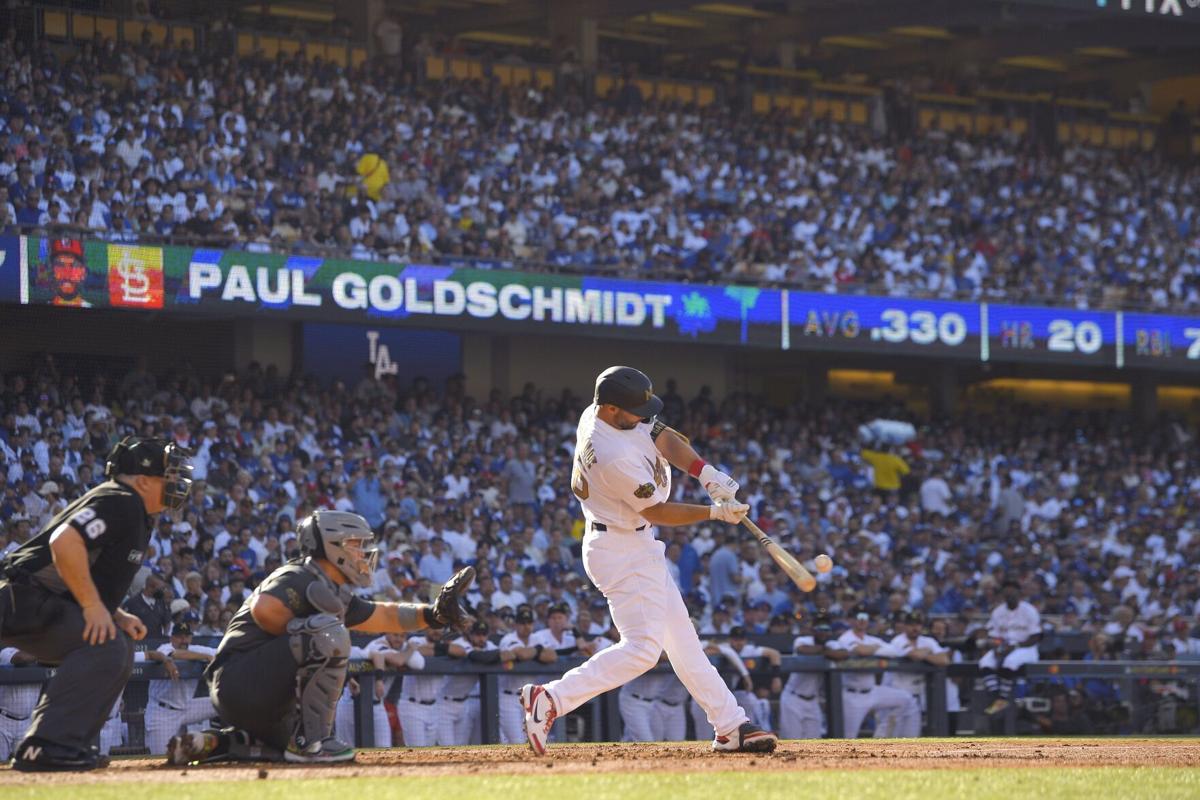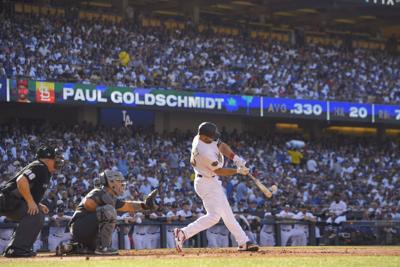The lack of a Major League Baseball franchise in North Carolina is one of the great curiosities and noteworthy absences in professional sports.
After ending a professional major-league desert with the NBA’s Charlotte Hornets in 1988, North Carolina has landed teams in the NFL’s Carolina Panthers, NHL’s Carolina Hurricanes, NWSL’s North Carolina Courage and MLS’ Charlotte FC.
The ninth-largest state by state population at 11.05 million as of January, North Carolina’s in-migration momentum has it poised to pass Georgia (11.18 million) and closing on Ohio (11.88 million).
Yet, even though North Carolina has a rich baseball heritage, including among the top-10 states in producing major-league players all time, and a blossoming sports wagering infrastructure, Charlotte and Raleigh still remains on the on-deck circle for an MLB franchise.
People are also reading…
The competition typically are listed as — in alphabetical order — Austin, Texas, Louisville, Ky., Mexico City, Montreal, Nashville, Tenn., Orlando, Fla., Portland, Ore., Salt Lake City, and San Antonio, Texas.
In reality, the expectation from professional sports analysts is MLB owners approving a team east and west of the Mississippi River.
Michael Walden, a retired N.C. State University economics professor and lifelong Cincinnati Reds fan, has released a preliminary report that measures the socioeconomic chances of Charlotte or Raleigh emerging from eight to 10 contenders to what could be up to two expansion franchises over the next five to seven years.
There’s also the possibility of Charlotte or Raleigh landing a relocated Tampa Bay Rays if its owners can’t reach a new baseball stadium agreement with local and state government officials. Of course, Tampa has been under consideration for relocation for much of its 27-year existence.
“Since professional sports is a business, economics must be considered in locating an MLB team,” Walden said.
“Three economic issues come up: feasibility, economic impact and financing for an MLB stadium.”
Feasibility comparison
Walden defined feasibility as “whether a region is big enough and growing enough to support an MLB team.”
Measuring for metro population, the Charlotte area at 2.37 million is larger than current MLB teams in St. Louis, Cincinnati, Cleveland, Kansas City, Pittsburgh and Milwaukee
Meanwhile, the Raleigh area at 1.66 million, is larger than Milwaukee.
When comparing against the other U.S. expansion contenders, Charlotte is smaller than only San Antonio at 2.52 million), while larger than Austin (2.31 million), Portland (2.26 million), Orlando (2.13 million), San Jose (1.85 million), Nashville (1.35 million), Salt Lake City (1.23 million) and Louisville (1.14 million).
Raleigh is larger than Nashville, Salt Lake City and Louisville.
Still, Charlotte and Raleigh pale in comparison with Mexico City at 22.75 million, while Montreal — a sentimental favorite after losing the Expos to Washington, D.C. — is at 4.38 million.
“My conclusion is Charlotte and Raleigh are feasible options for an MLB team,” Walden said.
Economic impact comparison
Walden defines economic impact as the broad effects of an MLB team on regional income and regional jobs.
“Professional sports teams are expected to increase regional growth in income and jobs through several methods,” Walden said.
“If having an MLB team makes the region more interesting and fun to live in, then jobs and incomes can increase from more businesses and workers wanting to live in the region.
“If the MLB team causes regional residents to spend more of their entertainment money in the region rather than outside the region, then local businesses will benefit,” Walden said.
The economic-impact key for Charlotte, according to Walden, is that it must dependably attract people living outside the region to visit the region for games and spend money on game tickets, food, lodging and other purchases.
That would include as far east at the Triad, as far west as Asheville and into upstate South Carolina as far as Greenville, Spartanburg and Columbia who could be converted from Atlanta Braves fans.
For Raleigh, the key is attracting fans as far west as the Triad, all of eastern N.C. and parts of southern Virginia who could be converted from Baltimore Orioles and Washington Nationals fans.
“Predicting fan attendance and the origin of the fans can be difficult,” Walden said.
An MLB team has almost twice as many home games at 81 as NBA or NHL teams at 41, as well as the eight to nine home games for an NFL team.
“Approximately half the earnings of MLB teams are paid to players,” Walden said. “In addition, since not all players live in the home region of their team, a part of the player salaries are not spent in the home region.
“The analysis must account for the possibility of households reducing spending on alternative local activities when they spend on MLB baseball.”
If you build it ...
Walden said the biggest — and most contentious — roadblock to an MLB team in North Carolina may be the stadium where the team will play.
Walden said it’s unlikely that a Charlotte MLB team would share Bank of America Stadium with the Carolina Panthers and Charlotte FC, while the minor league stadiums in uptown Charlotte and Carolina Mudcats in Zebulon were not constructed with a major league team in mind.
“An MLB team in North Carolina will likely require a stand-alone stadium that are very, very expensive,” Walden said.
“The stadium in Las Vegas currently being constructed for the Athletics is expected to cost between $1.75 billion and $2 billion. The same price tag has been estimated for an MLB stadium in Orlando.
“The projected cost of expanding the minor-league Charlotte Knights’ stadium for MLB use is put at between $500 million and $1 billion.”
Walden said an ownership team willing to pay for the majority, if not vast majority, of the stadium cost would be better received than asking the local community to supply the majority through a hotel occupancy tax or other tax method.
For example, in June 2024, the Charlotte City Council and the Panthers announced an agreement in which the Panthers would remain in Charlotte through at least 2045 in exchange for the city providing $650 million and team owner David Tepper $150 million for an $800 million renovation project.
“Between 70% and 80% of the new Las Vegas MLB stadium is being financed by the Athletics’ owner,” Walden said. “The group behind the efforts to secure an MLB team for Orlando has announced the stadium would be completely privately financed.
“In contrast, the Chicago White Sox have asked for $1 billion in city and state public funds for helping to finance a new stadium for the team. The Kansas City Royals MLB team is also recommending public financing for most of the cost of a new stadium.
“Therefore, MLB stadium financing options span from using all private money to using all public money, with options in-between,” Walden said.
Walden said the next phase of his review will involve a deeper dive into the three categories, as well as other potential challenges.
Such as can either Charlotte or Raleigh supports another major sports franchise in terms of consistent fan and corporate sponsorship support.
Particularly in supporting 81 home games for a start-from-scratch MLB franchise years from competitiveness.
That’s a particular reality in August and September when an MLB team would compete against the Panthers in Charlotte, and North Carolina, N.C. State, Duke, East Carolina and N.C. Central in the Triangle and eastern N.C.
Other perspectives
With speculation swirling about potential MLB expansion, ESPN weighed in with a February article .
The Charlotte pros included the size of its metro that Walden cited, that it “already has proved it can support multiple professional sports teams,” and that the AAA Charlotte Knights rank 10th among all minor league teams in 2024 attendance with its scenic uptown location.
The main con is Charlotte is competing with Nashville in what is likely to be one, if any, expansion team in the Southeast.
“The Music City has demonstrated more organized interest in bringing an MLB team than Charlotte has, so the Charlotte MLB Project — a movement to bring baseball to Charlotte — would have to kick into high gear to close the gap,” according to the article.
The Raleigh pros include having Tom Dondon, owner of the Hurricanes, as a major supporter, and the Lenovo Center/Carter Finley Stadium campus has ample room for a baseball stadium.
The report also cites the Triangle’s metro — in particular its TV market — and “having the highest median income of any metro area without an MLB team.” The Hurricanes had the second-largest attendance among NHL teams in 2023-24 season.
The Raleigh cons again lead with competing against Nashville, which ESPN described as “the sexier pick.”
Zagros Madjd-Sadjadi, an economics professor at Winston-Salem State University, predicts Charlotte would beat out Raleigh for an MLB franchise “because it is more populous and because it is more likely to have a dedicated corporate base of support.”
In terms of statewide fan appeal, Madjd-Sadjadi said the very nature of having 81 home games dilutes the must-see nature of a Panthers, Hurricanes or Hornets game unless they are front-runners for a championship.
“MLB season ticket holders typically do not drive from one major metro area to another,” he said, although major crowds could be expected when teams with national followings, such as the Boston Red Sox, Chicago Cubs, Los Angeles Dodgers, New York Mets and New York Yankees are in town.
It’s the same scenario when the Dallas Cowboys, Pittsburgh Steelers and Chicago Bears play the Panthers at Bank of America Stadium.
However, there’s a risk of low attendance if the Charlotte or Raleigh team is struggling and teams with minimal national followings, such as Tampa Bay, Florida and the Athletics, are in town.
Todd McFall, a sports economist at Wake Forest University, said Charlotte and Raleigh are both “big enough to support MLB,” though he questions the support an MLB team would draw when competing for corporate dollars and fan attendance with established major professional teams.
“Speaking of the Triangle, the economic impact will be large to begin and then drop off fairly consistently over time. I see it being less impactful for Charlotte given the NBA and NFL presence.”
McFall said another key factor with MLB expansion is sports wagering.
“To some extent, the stadium is a glorified TV studio that allows for interested parties to judge their ability to predict outcomes,” McFall said.
















